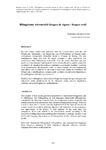Bilingüismo intermodal (lengua de signos / lengua oral)

View/
Use this link to cite
http://hdl.handle.net/2183/38022
Except where otherwise noted, this item's license is described as Licencia "Reconocimiento - NoComercial – Sin obra derivada (CC BY-NC-ND)"
Collections
- Investigación (FFIL) [885]
Metadata
Show full item recordTitle
Bilingüismo intermodal (lengua de signos / lengua oral)Author(s)
Date
2019Citation
Morales López, E. (2019): “Bilingüismo intermodal (lengua de signos / lengua oral)”. Revista de Estudios de Lenguas de Signos REVLES: Aspectos lingüísticos y de adquisición de las lenguas de signos, Morales López, E. y Jarque Moyano, M. J. (eds.), 1: 340-365.
Abstract
[Resumen] En este trabajo realizo una reflexión sobre las características generales del
bilingüismo intermodal y sus diferencias con el bilingüismo en lenguas orales
(bilingüismo intramodal), defendido desde el Consejo de Europa. De esta
comparación, surge una serie de rasgos comunes y otros específicos que
caracterizan dicho bilingüismo intermodal. Con ello quiero demostrar que este
puede ser correctamente implementado en el sistema educativo español, a partir de
un objetivo de planificación realista y orientado a su principal finalidad: la mejora
de la alfabetización del alumnado sordo. Al mismo tiempo, de esta comparación
concluimos que el oralismo es un modelo anacrónico según los estándares del
bilingüismo y plurilingüismo, porque puede conducir a la privación lingüística o
al semilingüismo del niño y joven sordos. [Abstract] This chapter reflects on the general characteristics of intermodal bilingualism and
its differences with bilingualism in oral languages (intramodal bilingualism),
defended by the European Council. From this comparison, a series of specific and
common features that characterize such intermodal bilingualism emerge. With this
I want to show that it can be correctly implemented in the Spanish educational
system, based on a realistic planning objective and oriented to its main purpose:
the improvement of the literacy of deaf students. At the same time, this
comparison shows that oralism is an anachronistic model, according to the
standards of bilingualism and multilingualism defended by Europe, because it can
lead to the language deprivation or semi-lingualism of deaf children and young
people.
Keywords
Bilingüismo intermodal
Bilingüismo lengua de signos/lengua oral
Educación sorda
Planificación de la educación sorda
Minoría lingüística
Oralismo
Privación lingüística
Semilingüismo
Intermodal bilingualism
Bilingualism sign language/oral language
Deaf education
Planning of Deaf education
Linguistic minority
Oralism
Language deprivation
Semilingualism
Bilingüismo lengua de signos/lengua oral
Educación sorda
Planificación de la educación sorda
Minoría lingüística
Oralismo
Privación lingüística
Semilingüismo
Intermodal bilingualism
Bilingualism sign language/oral language
Deaf education
Planning of Deaf education
Linguistic minority
Oralism
Language deprivation
Semilingualism
Editor version
Rights
Licencia "Reconocimiento - NoComercial – Sin obra derivada (CC BY-NC-ND)"
ISSN
2695-4133






